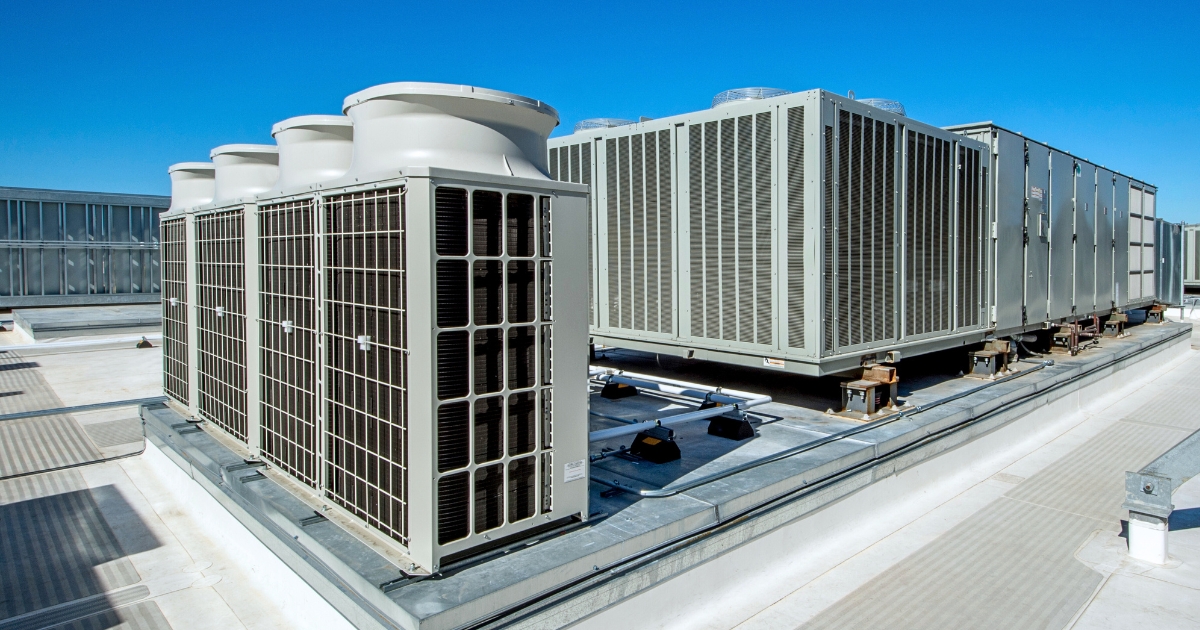Energy efficient HVAC systems are a cornerstone for homeowners eager to cut down on energy consumption while improving indoor comfort. If you’re considering a switch to these modern systems, here are a few benefits quickly:
- Lower energy bills: Use less electricity and reduce your monthly expenses.
- Consistent temperatures: Experience even heating and cooling throughout your home.
- Eco-friendly: Reduce your carbon footprint with more efficient systems.
In today’s market, finding cost-effective heating and cooling solutions is crucial. Upgrading your HVAC not only saves energy but also improves comfort by efficiently managing cool air. A well-insulated home, paired with an efficient HVAC system, can significantly cut your energy usage and costs.
Choosing the right upgrade can be overwhelming, though. Should you consider a heat pump, a ductless mini-split, or a high-efficiency central AC? Each option offers unique benefits and savings opportunities.
Stay tuned as we uncover the top energy-saving HVAC options for 2024!
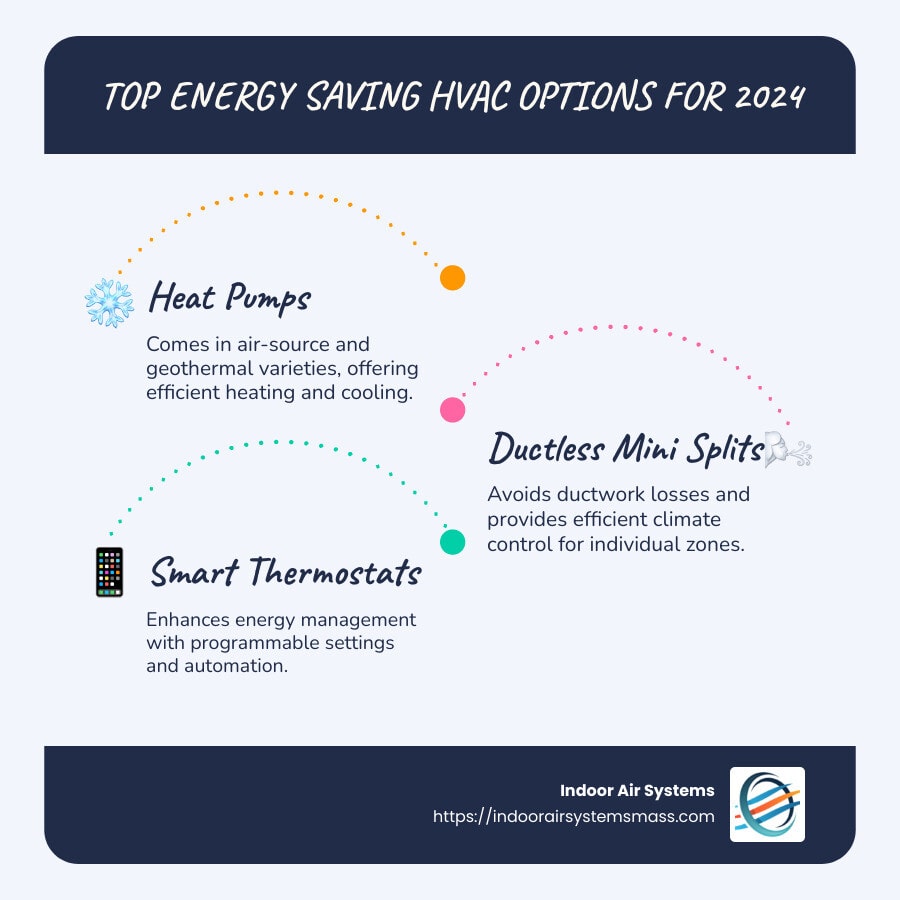
Table of Contents
Understanding Energy Efficient HVAC Systems
When it comes to energy efficient HVAC systems, the landscape is diverse and filled with innovative technologies. Here’s a breakdown of some top contenders, each offering unique benefits:
Heat Pumps
Heat pumps are versatile systems that provide both heating and cooling. They work by transferring heat rather than generating it, making them a highly energy efficient heating solution. There are several types of heat pumps to consider:
- Air-Source Heat Pumps: These are popular for their ability to extract heat from the air. They are powered by electricity and can efficiently heat your home in winter and cool it in summer. With SEER ratings often between 20-25, they offer substantial energy savings.
- Geothermal Heat Pumps: Utilizing the stable temperatures underground, geothermal systems are incredibly efficient. They provide consistent heating and cooling regardless of outdoor conditions, leading to significant energy savings. Even when it’s freezing or scorching outside, a few feet underground stays about the same temperature.
- Ductless Mini Splits: These systems are perfect for homes without existing ductwork. They consist of an indoor air-handling unit and an outdoor compressor. Ductless mini splits avoid the energy losses associated with ducts, making them a top choice for energy efficiency. They’re easy to install and are ideal for room additions or retrofits.
Geothermal Systems
Geothermal systems are a standout in the field of energy efficiency. By tapping into the earth’s consistent underground temperatures, they provide reliable heating and cooling with minimal energy use. Although the initial installation cost can be higher, the long-term savings on energy bills are significant. These systems are perfect for homeowners looking to invest in a sustainable and efficient solution.
Air-Source Heat Pumps
Air-source heat pumps continue to gain popularity due to their dual functionality and efficiency. They are particularly well-suited for moderate climates and offer a cost-effective way to manage home temperatures year-round. With advancements in technology, modern air-source heat pumps are more efficient than ever, providing a viable alternative to traditional HVAC systems.
Ductless Mini Split Systems
For those seeking flexibility and efficiency, ductless mini splits are an excellent option. They eliminate the need for ductwork, which can account for over 30% of energy consumption in traditional systems. This makes them a great choice for older homes or spaces where installing ducts is impractical. Many mini splits are also ENERGY STAR certified, ensuring they meet strict energy efficiency guidelines.
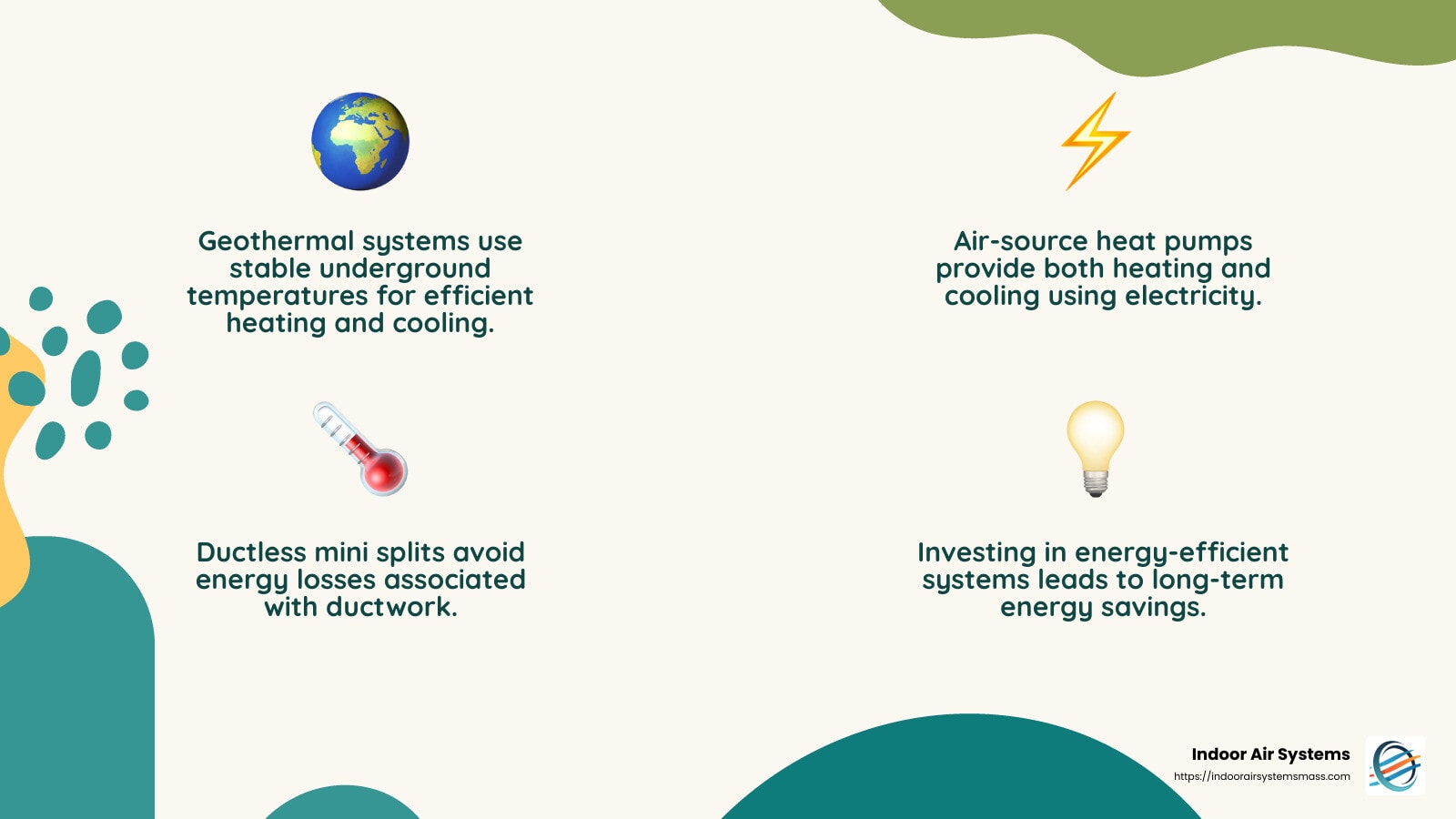
Each of these systems brings its own set of advantages, from reducing energy bills to offering environmentally friendly solutions. As you steer the options, consider your home’s specific needs and the potential long-term savings each system can provide. Stay tuned as we explore the top energy-efficient HVAC systems for 2024!
Top Energy Efficient HVAC Systems for 2024
Geothermal Heat Pumps
Geothermal heat pumps are a powerhouse of efficiency. They harness the consistent underground temperatures to provide heating and cooling, making them incredibly reliable regardless of the weather outside. Efficiency ratings for these systems are impressive, often leading to substantial energy savings over time. The initial investment might be higher, but the payoff in reduced utility bills and environmental impact makes it worthwhile for eco-conscious homeowners.
Air-Source Heat Pumps
Air-source heat pumps are gaining traction for their versatility and energy efficiency. These systems are powered by electricity and are adept at both heating and cooling your home. With SEER ratings between 20-25, they offer a significant reduction in energy consumption. This makes them a smart choice for those looking to cut costs and reduce their carbon footprint without sacrificing comfort.
Ductless Mini Split Systems
Ductless mini splits offer a flexible and efficient solution for homes without existing ductwork. They consist of an indoor air-handling unit and an outdoor compressor, avoiding the energy losses that can occur in ducted systems. Energy efficiency is a standout feature, as these systems can save up to 30% of energy typically lost in ductwork. They’re easy to install, making them ideal for room additions or specific zones in your home. Plus, many are ENERGY STAR certified, ensuring they meet high efficiency standards.
Measuring Energy Efficiency in HVAC Systems
Measuring energy efficiency in HVAC systems is crucial to determine their performance and potential cost savings. Several key metrics help homeowners compare the energy efficiency of different systems:
- Seasonal Energy Efficiency Ratio (SEER): This metric measures the cooling efficiency of an air conditioner or heat pump over a typical cooling season. A higher SEER rating indicates greater energy efficiency, which can lead to lower energy bills.
- Energy Efficiency Ratio (EER): EER measures the cooling efficiency of an air conditioner or heat pump under specific laboratory conditions. It provides a snapshot of the system’s performance at peak operating conditions.
- Heating Seasonal Performance Factor (HSPF): HSPF measures the efficiency of a heat pump during the heating season. A higher HSPF rating means the system is more efficient at converting electricity into heat.
- Annual Fuel Utilization Efficiency (AFUE): This metric measures the efficiency of a furnace in converting fuel into heat over a year. A higher AFUE rating indicates a more efficient furnace, which can result in significant energy savings.
By understanding these metrics, homeowners can make informed decisions when selecting a new HVAC system, ensuring they choose the most energy-efficient option for their needs.
High-Efficiency Central Air Conditioners
For those with larger homes, high-efficiency central air conditioners provide an excellent option. These systems typically have SEER ratings around 20, ensuring they use energy wisely while keeping your home cool. They work in tandem with your home’s ductwork to distribute air evenly, making them a reliable choice for consistent comfort. The energy savings from these units can be substantial, especially during hot summer months.
Smart Thermostats and Controls
Smart thermostats are the brains behind modern HVAC systems. They offer programmable capabilities that allow homeowners to manage energy use with precision. These devices learn your schedule and preferences, automatically adjusting temperatures to maximize comfort and efficiency. By optimizing your HVAC system’s operation, smart thermostats can lead to significant energy savings and improved energy management.
Each of these energy efficient HVAC systems presents unique benefits custom to different needs and preferences. Whether you’re prioritizing cutting-edge technology or aiming for long-term cost savings, there’s a solution out there for every home. As you consider your options, weigh the efficiency ratings, potential energy savings, and installation requirements to find the best fit for your lifestyle.
Benefits of Energy Efficient HVAC Systems
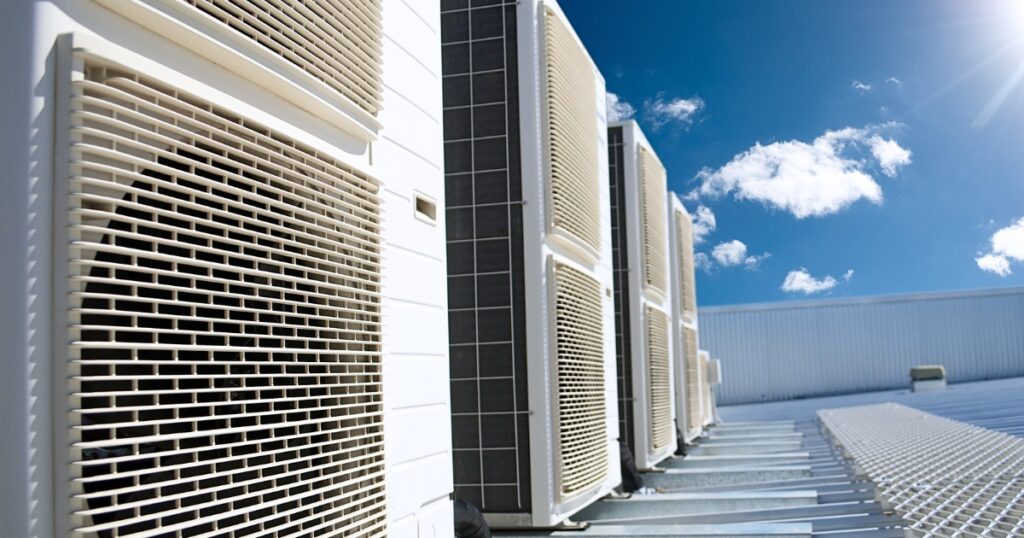
Switching to energy efficient HVAC systems can bring a host of benefits that go beyond just keeping your home comfortable. Let’s explore why these systems are a smart choice for homeowners.
Lower Utility Bills
One of the most immediate benefits you’ll notice is a reduction in your utility bills. Energy efficient systems are designed to use less energy while delivering the same level of heating and cooling. For example, a high-efficiency central air conditioner with a SEER rating of 20 can significantly cut down your electric bills, especially during peak summer months. This means more money stays in your pocket each month.
Reduced Energy Consumption
Using less energy isn’t just good for your wallet—it’s great for the planet too. By upgrading to an energy efficient system, you’re reducing your overall energy consumption. This can have a big impact on your home’s carbon footprint, contributing to a more sustainable future. According to the U.S. Department of Energy, replacing older systems with energy efficient models can reduce energy use by up to 50% for electric heating and cooling systems.
Environmental Impact
The environmental benefits of energy efficient HVAC systems are substantial. By consuming less energy, these systems help decrease the demand on power plants, which in turn reduces greenhouse gas emissions. For eco-conscious homeowners, this means that choosing an energy efficient system is a step toward reducing your environmental impact. Geothermal heat pumps, for instance, take advantage of the earth’s natural heat, offering a renewable energy solution that’s both effective and eco-friendly.
Investing in energy efficient HVAC systems not only supports a more sustainable lifestyle but also delivers practical financial savings. It’s a win-win situation that benefits both you and the environment. As you explore your options, consider the long-term advantages these systems offer in terms of cost savings and ecological responsibility.
How to Choose the Best Energy Efficient HVAC System
Choosing the right energy efficient HVAC system for your home involves understanding a few key factors. Let’s break them down to make the decision-making process easier for you.
SEER and HSPF Ratings
When selecting an HVAC system, pay attention to the SEER (Seasonal Energy Efficiency Ratio) and HSPF (Heating Seasonal Performance Factor) ratings. These ratings help you gauge the efficiency of the system.
- SEER is like the miles per gallon for your air conditioner. The higher the SEER rating, the more efficient the system. Look for systems with a SEER rating of at least 14.5, which is the minimum for ENERGY STAR certification. Some systems even go up to 28 SEER, offering superb efficiency.
- HSPF is used for heat pumps and measures heating efficiency. A higher HSPF means better performance. Aim for a system with an HSPF of 8.5 or above to ensure optimal efficiency during the heating season.
ENERGY STAR Certification
An ENERGY STAR certification is a reliable indicator of energy efficiency. Systems with this certification meet strict guidelines set by the U.S. Environmental Protection Agency. It’s like a seal of approval that ensures your system is both efficient and environmentally friendly. Choosing an ENERGY STAR certified system can lead to significant energy savings and lower utility bills.
Home Size Considerations
The size of your home plays a crucial role in determining the right HVAC system.
- Larger Homes: If you have a bigger home, you might need a ducted system to ensure even distribution of heating and cooling. It’s important to match the system’s capacity with your home’s size to avoid energy waste.
- Smaller Homes or Apartments: For smaller spaces, a ductless mini split system might be ideal. These systems are highly efficient and allow for zoning, meaning you can control the temperature in individual rooms.
Climate and Geography
Don’t forget to consider your local climate. If you live in a region with extreme temperatures, you might need a system with higher efficiency ratings to handle the load. For example, in colder climates, a heat pump with a high HSPF rating might be more suitable, while in hotter areas, a high SEER air conditioner could be beneficial.
Common Mistakes to Avoid When Choosing an HVAC System
Choosing the right HVAC system can be overwhelming, and there are several common mistakes to avoid:
- Not Considering the Size of the Home and the Climate: A system that is too small or too large for your home can lead to reduced energy efficiency and increased energy bills. It’s essential to choose a system that matches your home’s size and local climate conditions.
- Not Checking the Energy Efficiency Ratings: Always look for systems with high SEER, EER, and HSPF ratings to ensure maximum energy efficiency. These ratings provide a clear indication of the system’s performance and potential energy savings.
- Not Considering the Type of System: Different types of systems, such as air source heat pumps, geothermal heat pumps, and high-efficiency furnaces, offer varying levels of energy efficiency. It’s important to choose a system that best suits your home’s needs and your energy efficiency goals.
- Not Checking the Warranty and Maintenance Requirements: A system with a comprehensive warranty and regular maintenance requirements can ensure optimal performance and energy efficiency. Regular maintenance helps identify potential issues before they become major problems, ensuring your system runs efficiently.
By avoiding these common mistakes, homeowners can choose an energy-efficient HVAC system that meets their needs and budget, leading to long-term energy savings and improved comfort.
HVAC System Installation and Maintenance
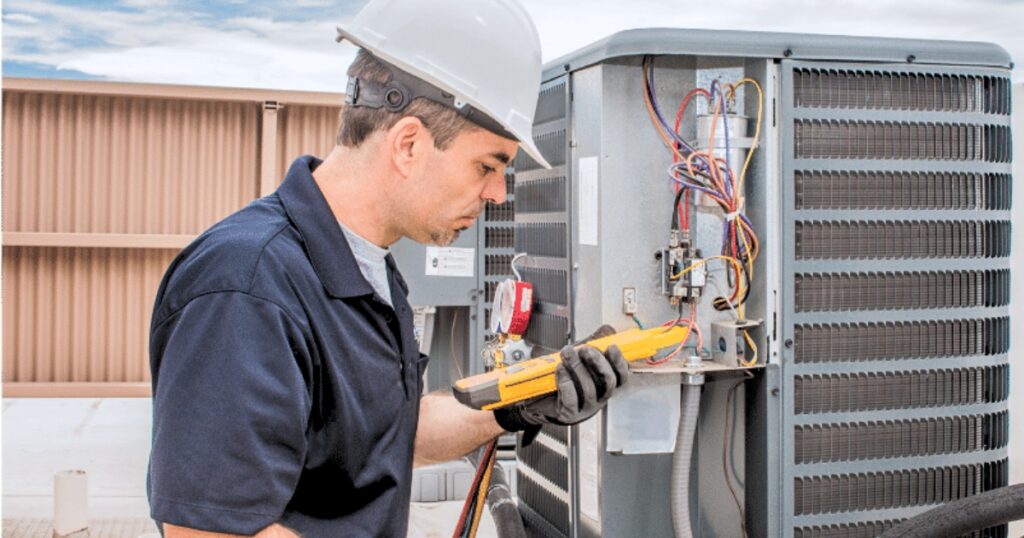
Proper installation and maintenance are crucial to ensure the optimal performance and energy efficiency of an HVAC system. Here are some tips to help you get the most out of your system:
- Hire a Professional Installer: A professional installer can ensure that the system is installed correctly and meets the manufacturer’s specifications. Proper installation is key to achieving the system’s maximum energy efficiency.
- Regular Maintenance: Regular maintenance can help identify potential issues before they become major problems. Scheduling annual check-ups with a professional can ensure your system operates efficiently and effectively.
- Change the Air Filter: A dirty air filter can reduce the performance and energy efficiency of the system. Make it a habit to check and replace the air filter regularly to maintain optimal airflow and efficiency.
- Check the Ductwork: Leaky or damaged ductwork can reduce the energy efficiency of the system. Inspect your ductwork periodically and seal any leaks to prevent energy loss.
By following these tips, homeowners can ensure that their HVAC system operates efficiently and effectively, leading to lower energy bills and a more comfortable home.
Maximizing Energy Efficiency
Maximizing energy efficiency is crucial to reduce energy consumption and lower energy bills. Here are some tips to help you achieve this:
- Use a Programmable Thermostat: A programmable thermostat can help regulate the temperature and reduce energy consumption when the home is unoccupied. Set it to lower the temperature when you’re away and raise it just before you return.
- Use Zoning Systems: Zoning systems can help regulate the temperature in different areas of the home, reducing energy consumption by only heating or cooling the areas that are in use.
- Use Energy-Efficient Windows: Energy-efficient windows can help reduce heat loss in the winter and heat gain in the summer, leading to lower energy consumption and more consistent indoor temperatures.
- Use Energy-Efficient Appliances: Energy-efficient appliances, such as ENERGY STAR certified models, can help reduce energy consumption and lower energy bills. These appliances are designed to use less energy while providing the same level of performance.
By following these tips, homeowners can maximize energy efficiency, reduce their energy consumption, and lower their energy bills, all while maintaining a comfortable home environment.
Final Thoughts
Choosing the right energy efficient HVAC system involves balancing efficiency ratings, certifications, and your specific home needs. By considering these factors, you’ll be better equipped to select a system that provides comfort, saves energy, and reduces your environmental impact.
Now that you know how to choose the best system, let’s address some common questions about energy efficient HVAC systems.
Conclusion
Our team brings over 20 years of experience in the HVAC industry, ensuring that you receive expert guidance and responsive service every step of the way. We believe in making energy efficiency accessible to all, and our local expertise means we’re well-versed in the unique climate challenges of Massachusetts.
Whether you’re looking to reduce your utility bills, minimize your environmental impact, or simply improve your home’s comfort, Indoor Air Systems is here to help. We pride ourselves on our ability to provide reliable, expert service with a personal touch. If you’re considering an upgrade to a more energy-efficient system, or if you have questions about the best options for your home, we’re ready to assist.
Contact us today at Indoor Air Systems, we understand the importance of choosing the right energy efficient HVAC systems for your home. Based in Central Massachusetts, we specialize in providing personalized heating and cooling solutions custom to your specific needs. Our focus on mini-split systems allows us to deliver efficient and cost-effective climate control without the high overhead costs associated with larger companies.
For more information about our services and how we can help you achieve greater energy efficiency, visit our Central Air Conditioning Massachusetts page. Let us help you find the perfect HVAC solution for your home.
Frequently Asked Questions about Energy Efficient HVAC Systems
What is the most energy efficient HVAC system?
When it comes to energy efficient HVAC systems, the ductless mini split heat pump often tops the list. These systems are known for their high efficiency, particularly in smaller spaces where ductwork isn’t practical.
They offer a versatile solution by providing both heating and cooling without the energy loss associated with ducted systems. With SEER ratings often reaching between 20 to 25, they are an excellent choice for those prioritizing energy efficiency.
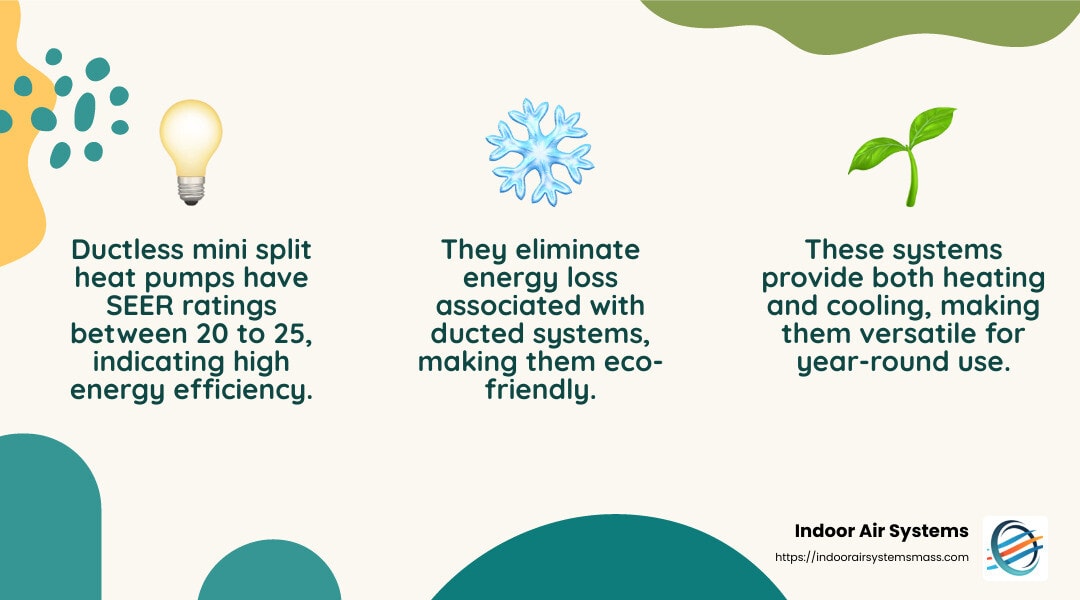
Is investing in energy efficient HVAC systems worth it?
Investing in an energy efficient HVAC system can lead to significant long-term savings. Although the initial cost might be higher than standard systems, the reduction in utility bills over time often offsets this expense. Lower utility bills are a direct result of using less energy to achieve the same level of comfort in your home. Additionally, energy efficient systems tend to have a longer lifespan, minimizing replacement and maintenance costs.
What factors should I consider when selecting an energy efficient HVAC system?
Choosing the right system involves several considerations:
- Climate: Your local climate plays a vital role. In colder areas, a heat pump with a high HSPF rating might be more efficient. In warmer climates, focus on systems with high SEER ratings.
- Home Size: The size of your home affects the type of system you need. Larger homes might benefit from a central air system, while smaller homes can maximize efficiency with a ductless mini split.
- Efficiency Ratings: Always check the SEER and HSPF ratings. Higher ratings mean more efficiency. Look for systems with ENERGY STAR certification to ensure they meet rigorous efficiency standards.
By considering these factors, homeowners can select an HVAC system that not only meets their comfort needs but also improves energy efficiency and reduces environmental impact.
Our Content
At Indoor Air Systems, LLC, we provide specialized HVAC services with a personal touch. Serving Central Massachusetts, we focus on the installation and maintenance of mini-split systems, split system air conditioner, heating and cooling system, heating air, ensuring efficient and cost-effective heating and cooling solutions. Our locally owned and operated business allows us to offer exceptional customer attention and responsiveness without the high costs associated with larger companies. Choose Indoor Air Systems for reliable, expert service tailored to your specific needs.

